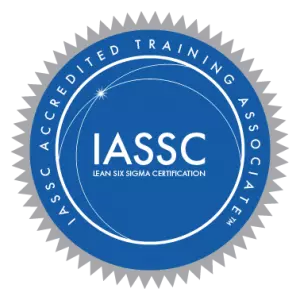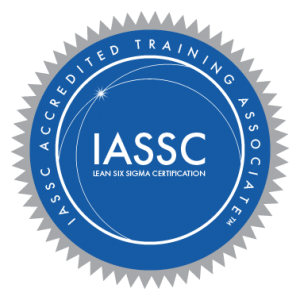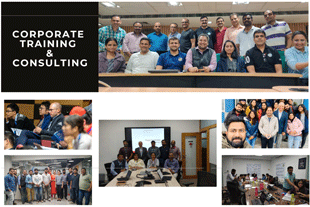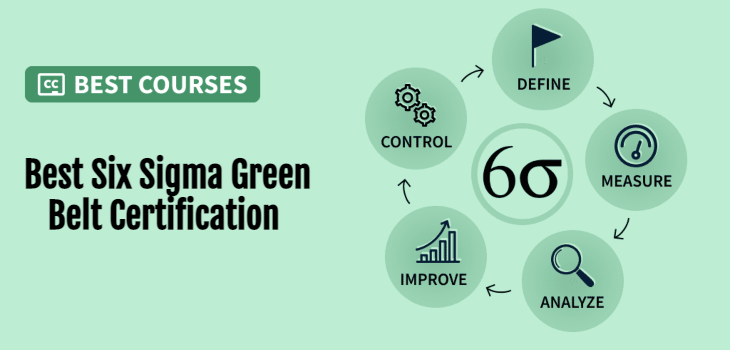Lean Six Sigma Black Belt Certification
The Black Belt Certification is a third-level belt of the six sigma family and the most exceptional level affirmation. The Black Belt Certification holders are experts who are relied upon to function as a six sigma venture proprietor or pioneer and guide and coach green belt holders under them. A Black Belt ought to show group initiative, change management, comprehend group elements, and dole out colleague jobs and duties regarding finishing the six sigma projects. The LSSBB course also prepares you for the Certified Manager of Quality ( CMQ/OE ) Certification.
Black Belt Certification holders are capable of six sigma DMAIC system, DEFINE | MEASURE | ANALYZE | IMPROVE | CONTROL and work under the supervision of Master Black Belt Holders.
- Learn Lean Six Sigma Black Belt via the most advance and effective learning methodology.
- Live Instructor-Led Six Sigma Black Belt Training with live projects and 24*7 learning support.
- Learn high-level Data Analysis, DFSS Certification Online, and Change Management with MINITAB PRO Simulations.
- The training is delivered by Master Black Belt experts with case studies and projects.
Global Recognition of Your Certification
- Lean Six Sigma curriculum and certification Accredited by The Council For Six Sigma Certification, USA
- Certification Accredited by International Quality Federation, USA
- Training aligned and acknowledging the BOK of The American Society For Quality, USA
- Course Approved by Ministry of Skill Development & Entrepreneurship, Govt. of India
- Certification accredited by UKAC, United Kingdom
- Certification accredited by ATA, International Association For Six Sigma Certification, USA
This Black Belt program develops your expertise in productivity and excellence with hands-on knowledge from Master Black Belt Experts. Learn practical applications in quality projects, Lean, DFSS, The Design For Six Sigma, and DMAIC. Gain in-depth knowledge and critical skills in Lean Management, Six Sigma Green Belt, Minitab, and Six Sigma Black Belt.
Six Sigma Black Belt possesses a thorough understanding of all aspects of the Lean Six Sigma Method including a high level of competence in the subject matters contained within the phases of Define, Measure, Analyze, Improve, and Control (DMAIC) as defined by the Lean Six Sigma Black Belt Body of Knowledge.
| Participants INTRODUCTION & ROTI ( Return on Training Investment) setup | A brief intro of participants & Learning objective | ||||||
| Expectation setup from the workshop | |||||||
| An overview to lean six sigma benefits, application, and relevance in participants profile | |||||||
| Guide to download MINITAB | |||||||
| Live project selection | |||||||
| Guide to using and download Templates and Toolkits application for Project work | |||||||
| Introduction to QUALITY and LEAN SIX SIGM | History of Quality (Deming, Juran, Ishikawa, Taguchi, etc.) | ||||||
| Evolution of Six Sigma | |||||||
| Evolution of LEAN manufacturing | |||||||
| Six Sigma – philosophy and objectives | |||||||
| Deliverables of a Lean Six Sigma Project | |||||||
| Six Sigma Roles & Responsibilities | |||||||
| LEAN SIX SIGM frame work and how dose it work | Meanings of Six Sigma | ||||||
| Data driven decision making | |||||||
| The Problem Solving Strategy Y = f(x) | |||||||
| Understanding How DMAIC and DMADV frame work | |||||||
| Documenting STAKEHOLDER REQUIREMENTS | SIPOC - Identifying stakeholders and customers | ||||||
| Determining critical requirements | |||||||
| Identifying performance metrics | |||||||
| QFD - Quality Function Deployment | |||||||
| Voice of the Customer, Business and Employee | |||||||
| Market research | |||||||
| DEFINE PHASE tools | Project selection , Project prioritization , KANO Model , Juran's customer needs | ||||||
| Preparing project charter | |||||||
| Initiating teams, Stages of team evolution | |||||||
| Mapping As - is process flow | |||||||
| Understanding Critical to Quality (CTQ) and VOC to CTQ drill down | |||||||
| Cost of Poor Quality (COPQ) and its types | |||||||
| PROJECT & TEAM MANAGEMENT Fundamentals | Enterprise wide View , Team Formation , Team Facilitation , Team Dynamics | ||||||
| Time Management For Teams | |||||||
| Team Decision making Tools | |||||||
| Management and Planning Tools | |||||||
| Conflict Management | |||||||
| Team Performance Evaluation and Rewards | |||||||
| Project management plan and Baselines | |||||||
| Project Tracking | |||||||
| MEASURE PHASE tools | Understanding of Data , Types of Data , Dimensions of Data | ||||||
| Population Data (VS) Sample data , Sampling Techniques | |||||||
| Sample Size calculation, Confidence level and confidence interval | |||||||
| Data collection template and techniques | |||||||
| Measurement system analysis - Calibration , Gauge R&R , KAPPA analysis | |||||||
| Central Limit Theorem | |||||||
| Stability and Distribution types | |||||||
| Data Transformation techniques | |||||||
| Descriptive statistics (Measure of central tendency & Measure of variation) | |||||||
| Base Line sigma calculation (DPU, DPMO, Cp,Cpk) | |||||||
| ANALYZE PHASE tools | 7 QC Tools (Histogram, Cause-and-Effect Diagrams / Fishbone Diagram, Pareto charts, Control Charts, Scatter diagrams, Process Mapping, Check Sheet) | ||||||
| 5 Why Analysis , Control impact matrix, Affinity clustering | |||||||
| Data visualization - Box Plat , Tree Diagram, Multi Vari charts Trends and comparison charts | |||||||
| Hypothesis testing - Parametric test (Continuous Data , Discrete Data) Alpha & Beta errors | |||||||
| Non Parametric test (for Non Normal test) | |||||||
| Multivariate Analysis - Discriminant Analysis, Factor Analysis, Cluster Analysis, Multidimensional Scaling, Correspondence Analysis, Conjoint Analysis, Canonical Correlation | |||||||
| Multivariate Analysis of Variance (MANOVA) | |||||||
| DMADV TOOLS | Need for DMADV frame work and its history | ||||||
| Introduction to "Design Thinking" | |||||||
| TRIZ methods of Solution generation | |||||||
| Prioritization Matrix | |||||||
| Risk Mitigation techniques | |||||||
| Creativity tools | |||||||
| Analyzing and verifying design | |||||||
| Reliability statistics | |||||||
| LEAN METHODOLOGY | Fundamentals of lean , 5 principles of lean | ||||||
| Value add (VS) non value add and 8 Types of deadly waste | |||||||
| Value stream mapping - Lead Time , Processing Time, cycle time, Turn around Time, First Pass yield , Rolled Throughput Yield, Process cycle efficiency | |||||||
| Heijunka - Leveling, Sequencing, Stability, TAKT time | |||||||
| Jidoka, Poke Yoke, Autonomation, Built-in Quality, Stopping at Abnormalities | |||||||
| Visual Management, 5 S implementation | |||||||
| JIT (Just in time), Critical level of replenishment , Supermarket or consumption based replenishment, Kanban | |||||||
| Kaizen, LEAN action work out (AWO) | |||||||
| IMPROVE PHASE tools | Solution design matrix, Brain storming | ||||||
| Failure Mode effect analysis | |||||||
| Regression techniques - Simple linear regression , Multiple regression | |||||||
| Non Linear , Binary Logistic, Nominal Logistic, Ordinal Logistic regression | |||||||
| Design of experiments (DOE), Taguchi robustness concepts | |||||||
| Full Factorials, Fractional Factorials, Screening Experiments, Response Surface Analysis, EVOP (Evolutionary operations methodology) Mixture Experiments | |||||||
| PDCA - Plan, Do , Check , Act | |||||||
| Theory of Constraints (TOC) | |||||||
| Introduction to Digital transformation , Industry 4.0 , RPA | |||||||
| Basics of solution generation through "Design Thinking Concepts" | |||||||
| "Six Thinking Hats" - Dr. Edward de Bono | |||||||
| CONTROL PHASE tools | Statistical process control | ||||||
| Control plan for sustaining benefits | |||||||
| Introduction to Control Charts and Types of Control Charts | |||||||
| PROJECT DOCUMENTATION and Sustenance | CBA - Cost benefit analysis | ||||||
| Project documentation as per DMAIC frame work | |||||||
| Horizontal deployment of lessons learned | |||||||
| Inculcating LEAN SIX SIGMA DNA in all layers of organization | |||||||
From the course:
Six Sigma Black Belt unlocks up plenty of career opportunities. The potential for job growth will increase along with the overall pay. Those who are trained in this course can easily expect some openings exclusively offered to them. Those who are trained in this methodology have lucrative ideas and are respected and sought after in their field. Six Sigma Black Belt training can help in a number of ways and is widely applicable in every domain and process. Individuals looking to excel can easily tap into these training courses and get on the fast track to a successful career.
This Six Sigma Black Belt certification Online helps in:
- Demonstrates one’s ability to integrate Lean Six Sigma as a long-term continuous improvement philosophy in their organizations.
- Gives cutting-edge value to professional data.
- Improves job performance.
- Opens up greater career prospects.
- Demonstrate various leadership roles and responsibilities
- Gain a fundamental understanding of all components and techniques used in project management
- Demonstrate team leadership and understand team dynamics
- Demonstrates one’s ability to apply Enterprise-wide high-complex DMAIC projects.
According to recent surveys by sixsigma.com, the median Six Sigma Black Belt Salary for certified professionals in this field is approximately $83,107 per year.
From the workshop:
- Instructor-led training by Six Sigma Master Belt experts to make candidate learn the real scenario of six sigma tools and methodology
- Learn the principles and philosophy behind the Six Sigma method
- Dummy project by instructors to make candidate get hands-on on six sigma projects
- Downloadable e-book & estimate of Six Sigma Black Belt Certification Cost in India
- Industry-based case studies
- High-quality training from an experienced trainer
- The Program extensively uses Minitab, specialized statistical software. It provides you with a thorough knowledge of Six Sigma philosophies and principles (including supporting systems and tools).
The Six Sigma Black Belt program is the third level program (after Green Belt) designed for those who wish to be Project leads for Six Sigma projects, and are responsible for high-level problem-solving challenges. Black Belts serve as mentors and trainers for the other members of the project team.
There is no pre-requisites/eligibility criteria for the Black Belt certification. There is no educational or industry minimum experience requirement for the Black Belt certification.
One may directly proceed for the Black Belt Certification. If one has six sigma knowledge, has worked in six sigma projects, or knows the six sigma methodology, then green belt certification is not needed. You may directly plan for the Six Sigma Black Belt Certification Online.
Our best Six Sigma Black Belt certification in India includes the Green belt topic coverage. We provide you with the Green Belt learning material so as to refresh your six sigma knowledge and then take you to the advanced level of Black Belt training.
On successful completion of the course and course requisites, the candidate will receive Internationally recognized Certified Lean Six Sigma Black Belt Certification.
Certified Lean Six Sigma Black Belt training and certification is approved and accredited by CSSC, IASSC, IQF USA & UKAC UK.
This course offers the Six Sigma Certification Validation Tool for Employers
Your Six Sigma Certification Validation Tool can be used by employers, clients, and other stakeholders to validate the authenticity of the Six Sigma Certifications you have received. Using the program code located on your certified LSSBB certification, one can see all your training and certification details online.




















.jpg)

.webp)



















